‘We are in hell’: Thousands of migrants stranded on the beaches of northern Colombia, waiting for a boat to reach the Darién jungle
Venezuelan, Peruvian, Haitian, Chinese, and Afghan families endure hunger, disease, and violence while they raise money to cross the rainforest and reach Panama, on the only land route that leads from South America to the United States
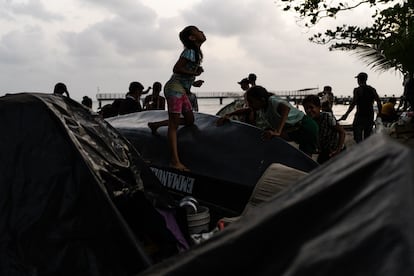

For two months Rosmery and Jean Carlos have been sleeping in a tent on Colombia’s Caribbean shore. They are surviving there with their 10-year-old twins and their dog, Candy. They are Venezuelans. They arrived at the beaches of Necoclí with their whole lives packed in a few suitcases. Their first objective — like thousands of migrants of different nationalities who are camping with them — is to get on a boat that will take them to Capurganá or Acandí, on the other side of the Gulf of Urabá. There the dense Darién jungle awaits them. The walk to the border with Panama takes three days. Then they have a long, expensive, and very dangerous road ahead of them to the United States. Until December they lived in Piedecuesta, near Bucaramanga (Colombia), more than 400 miles away from Necoclí. There they recycled waste, fixed up apartments, and cooked at private dinners and elegant hotels. They have abandoned everything to chase “the American dream.”
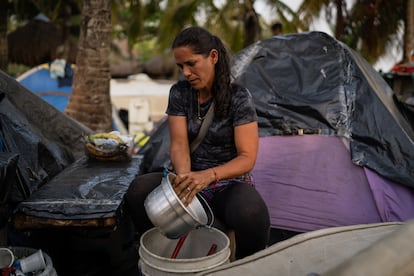
In 2023, more than 457,000 people crossed the border on foot, according to information from the Panamanian government and Human Rights Watch. Almost double the 248,000 that passed through the area in 2022. Although there are no exact calculations for 2024, the local authorities in Urabá estimate that every day there is a flow of between 1,000 and 2,000 migrants, concentrated in the ports of Necoclí and Turbo on the Atlantic. But there is an aggravating factor for the settlements: many migrants cannot continue on their way immediately due to economic difficulties, security issues, or because the boats cannot cope. Like Rosmery and Jean Carlos, thousands of Venezuelan, Peruvian, Ecuadorian, Haitian, Cuban, Chinese, and Afghan families remain stranded in Necoclí for weeks or months on end. They endure hunger and suffer illness and violence while they raise the money to cross the jungle.
“I am a cook and my husband is a chef, but in Necoclí we have been very hungry,” Rosmery tells EL PAÍS. “On January 8, when we arrived, I weighed 67 kilos. Now I’m 57.” Her husband went from 85 kilos to 74. The dog is also skinny and dehydrated. They have made many sacrifices so that their children can have three meals a day. “The hardest day was when Jean Carlos started crying and asked me why I had brought him here. We are in hell,” says Rosmery. She shakes her head with resignation: “It made me depressed. I was powerless. You don’t have money for food. You have to use a filthy bathroom. It is awful. I sometimes cooked for 800 people. There was plenty of food. We could eat whatever we wanted. Now we have nothing.” The beach, the sun, and the sea have hit the whole family hard. “The children got chickenpox, a terrible cough, and fever. A lot of nights they cried.”
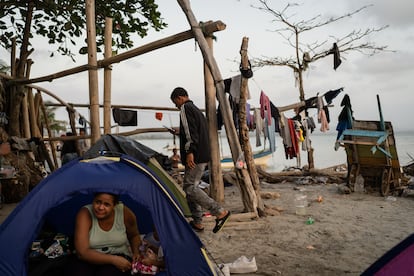
The past week was particularly difficult in Necoclí. On Thursday, February 22, the police and the navy arrested the captains of two boats for crimes related to migrant trafficking. According to the Prosecutor’s Office, the high-speed launches transported 151 migrants “illegally and dangerously.” Shipping companies ceased operations in protest. That generated a massive backlog. The migrants continued to arrive at the usual pace, but they could not continue on their way. About 5,000 people gathered on the beaches. Food, drinking water, and camping space became increasingly limited. The humanitarian situation became extreme.
On the afternoon of February 29, the departmental authorities and the companies agreed that the routes would resume in the early morning of March 1. That’s how it went. Last Friday at 5 a.m. hundreds of people gathered in long lines at Necoclí's two docks to get on the boats. In the middle of the crowd, everything seemed orderly even though there were no police or soldiers. Secretary of Government of Necoclí Johann Wachert explained in dialogue with EL PAÍS that, under the agreement, Migration Colombia has to bring more officials to the ports “to prevent irregularities in travel and to meet minimum safety standards.” In addition, it is expected that on March 6 a security council will be held with the police, the navy, and the Prosecutor’s Office to “set joint criteria and ensure that the boat captains are not persecuted.”
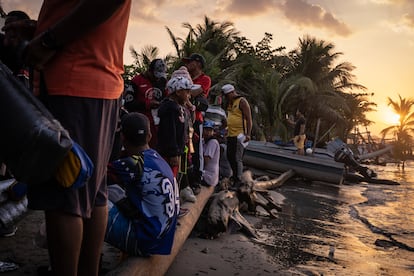
The area’s lucrative migrant trade is controlled by the Gulf Clan, the most powerful organized crime group in the country. EL PAÍS spoke with at least 10 people from Necoclí, from different professions, and they all agreed that not a single dollar, migrant, or boat moved without permission from “the owners of the world,” as one of the sources called them. One of the Gulf Clan’s guards protecting the beach where all the migrants are camped threatened the photographer who took the images that accompany this report. Colombian President Gustavo Petro told the New York Times that the Gulf Clan earns $30 million annually from the immigration business. “This must be one of the most lucrative businesses for the organization, earning them even more than drugs,” a source from the municipality who knows the situation told EL PAÍS.
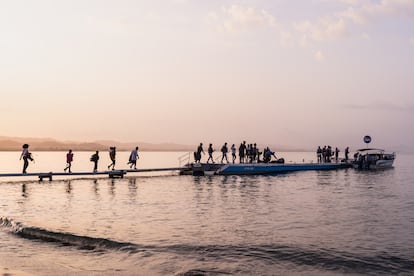
Secretary Wachert says he does not know about the Gulf Clan’s role in migrant trafficking: “We do not have direct knowledge of these organizations or contact with them. We cannot verify it because we do not know at what point in the chain it happens.” However, the Ombudsman’s Office published a report in 2023 confirming that the criminal organization has all the power in the area and handles drug trafficking and migrant smuggling.
While gangsters and some local businessmen get rich, the migrants live in misery. Among them are three trans women who, in addition to the pain of poverty and leaving their home, have suffered discrimination. The evangelical churches, which sometimes give food to the migrants, ignore them: “When we get to the line they say that the lunches are over,” says one of the three Venezuelan friends who braid other migrants’ hair to earn money for their onward journey. “We are here for the American dream, and to have the operation,” she says. Rosmery and Jean Carlos have helped them. They visit them, they lend them things to cook with, they do not discriminate against them.

The migrant couple takes turns working all day and all night. They sell coffee, candy, and cigarettes. Every peso they earn, they save to get the $990 they need to pay to ensure that all five of them reach the border (the cost is $330 per adult and $165 per child). Candy, the dog, is also going to cross the jungle in a special bag. “We are just $400 short,” says Jean Carlos with enthusiasm.
Next to Rosmery and Jean Carlos’s family tent lives Carmen Rosalía Rojas, perhaps the oldest person among all the migrants gathered on the beach. She is 64, has a couple of faded tattoos, and is the adoptive grandmother of a group of 23 Venezuelans who have been migrating from Chile. She sings, dances, and runs on the beach. “I want to go to the United States to see something new. I already know all this. I have been to Ecuador, Peru, Medellín, and Bogotá,” she says.
Albert Díaz, one of the Venezuelans who is with her, says that they found her at a gas station in Bogotá. “She was begging for money, selling candy. We saw her crying because her grandchildren had abandoned her and we told her to stay with us.” That was about a month ago and now they look like family. Albert carries Rosalía’s bag with her documents, doesn’t let her work, and says that they are going to cross the Darién jungle together. “I promised her that I was going to come to the United States with her.”

It is Thursday afternoon and the news that the boats will be running again the next day spreads quickly from tent to tent. Some migrants are happy because the dream of reaching the other side is just that little bit closer. Others are distressed because they have not yet gotten enough money together. Everyone is afraid of the jungle.
Last week Doctors Without Borders reported an increase in attacks on migrants passing through Darién. “In recent weeks, health teams have recorded more attacks of extraordinary physical and sexual violence and an unprecedented number of assaults in what is feared could be a worsening of the already terrible situation on the jungle route,” the organization states in a report. In just one week in February, its medical teams treated 113 victims of sexual assault, including nine minors.
Night falls. Amid the difficulties, the migrants have built a large family on the beach. “We are in hell, but we are not alone,” one of them says and smiles. They make a bonfire. They cook pasta with tomato sauce and distribute it to everyone nearby. One is a young man who dreams of being a rapper in Harlem. His stage name is Turbo. He sings while shaving and cutting his friends’ hair. It doesn’t matter that until recently they didn’t know each other, now they are family, and they know that sticking together is the only way to make tragedy more bearable.
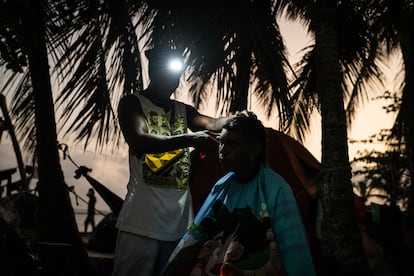
Sign up for our weekly newsletter to get more English-language news coverage from EL PAÍS USA Edition
Tu suscripción se está usando en otro dispositivo
¿Quieres añadir otro usuario a tu suscripción?
Si continúas leyendo en este dispositivo, no se podrá leer en el otro.
FlechaTu suscripción se está usando en otro dispositivo y solo puedes acceder a EL PAÍS desde un dispositivo a la vez.
Si quieres compartir tu cuenta, cambia tu suscripción a la modalidad Premium, así podrás añadir otro usuario. Cada uno accederá con su propia cuenta de email, lo que os permitirá personalizar vuestra experiencia en EL PAÍS.
¿Tienes una suscripción de empresa? Accede aquí para contratar más cuentas.
En el caso de no saber quién está usando tu cuenta, te recomendamos cambiar tu contraseña aquí.
Si decides continuar compartiendo tu cuenta, este mensaje se mostrará en tu dispositivo y en el de la otra persona que está usando tu cuenta de forma indefinida, afectando a tu experiencia de lectura. Puedes consultar aquí los términos y condiciones de la suscripción digital.








































